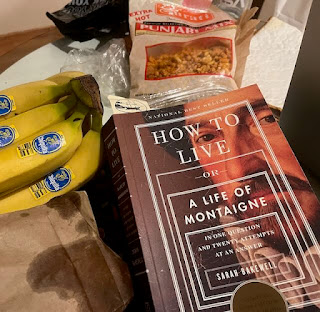That's the question raised in a book I picked up at the Elliott Bay Bookstore in Seattle during Thanksgiving.
I've just started reading Sarah Bakewell's How To Live or A Life of Montaigne. The picture puts the book into the context of the life I'm living at this moment, which, I hope will make more sense after you've read a couple of excerpts.
"This idea - writing about oneself to create a mirror in which other people recognize their own humanity - has not existed forever. It had to be invented. And, unlike many cultural inventions, it can be traced to a single person: Michel Eyquem de Montaigne, a nobleman, government official, and winegrower who lived in the Péirgord area of southwestern France from 1533 to 1592."
I no longer assume that people reading something like the end of the last sentence will automatically determine how long Montaigne lived (not quite 60 years), or the historical context (he was born forty years after Columbus reported the existence of a part of the world that Europeans hadn't known existed. Or maybe some descendants of Vikings knew but others didn't. I don't take this for granted because long ago I realized that things I do aren't necessarily the same things that other people do. Though I expect that regular readers of this blog figured that out before I mentioned it. Or would have if I hadn't placed this parenthetical paragraph here. The author will offer some more historical context in the following.
"Montaigne created the idea simply by doing it. Unlike most memoirists of his day, he did not write to record his own great deeds and achievements. Nor did he lay down a straight eyewitness account of historical events, although he could have done; he lived through a religious civil war which almost destroyed his country over the decades he spent incubating and writing his book."
Again, if I didn't know what religious civil war was being referred to, I would have stopped reading and looked it up. Here's a link to give you more about the French religious wars of the 16th Century. Meanwhile further south, the Spanish Inquisition was going on. I think the fact that he lived in difficult times makes the book more interesting to us today as we slide into our own version of an inquisition to rid the country of immigrants and other 'undesirables' in the eyes of Trump's people.
"A member of a generation robbed of the hopeful idealism enjoyed by his father's contemporaries, he adjusted to public miseries by focusing his attention on private life. He weathered the disorder, oversaw his estate assessed court cases as a magistrate, and administered Bordeaux as the most easygoing mayor in its history. All the time, he wrote exploratory, free-floating pieces to which he gave simple titles:"
At this point author Bakewell lists a number of his titles. I'll skip that. I'm not trying to copy her book, but rather to focus on ideas I found stimulating. This was just the context. And you'll note that while she says he lived in difficult times, the fact that he went on with his life as a nobleman and ran his estate as well as served as the mayor of Bordeaux, suggests that despite the wars, he was privileged enough for them to be irritants rather than serious interferences into his life. But this musing is based on the words in that paragraph, not further research, so take it with a grain of salt.
"He used [his] experiences as the basis for asking himself questions, above all the big questions that fascinated him as it did many of his contemporaries. Although it is not quite grammatical in English, it can be phrased in three simple words: 'How to live?'
"This is not the same as the ethical question, 'How should one live?' Moral dilemmas interested Montaigne, but he was less interested in what people ought to do than in what they actually did. He wanted to know how to live a good life - meaning a correct or honorable life, but also a fully human, satisfying, flourishing one. This question drove him both to write and to read, for he was curious about all human lives, past and present. He wondered constantly about the emotions and motives behind what people did. And since he was the example closest to hand of a human going about its business, he wondered just as much about himself."
And now we'll get to some of the questions he pondered. And I hope you will find them to be pretty close to ones we ponder today.
"A down-to-earth question, 'How to Live?' splintered into a myriad other pragmatic questions. Like everyone else, Montaigne ran up against the major perplexities of existence: how to cope with the fear of death, how to get over losing a child or a beloved friend, how to reconcile yourself to failures, how to make the most of every moment so that life does not drain away unappreciated. But there were smaller puzzles, too. How do you avoid getting drawn into a pointless argument with your wife, or a servant? How can you reassure a friend who thinks a witch has cast a spell on him? How do you cheer up a weeping neighbor? How do you guard your home? What is the best strategy if you are held up by armed robbers who seem to be uncertain whether to kill you or hold you to ransom? If you overhear your daughter's governess teaching her something you think is wrong, is it wise to intervene? How do you deal with a bully? What do you say to your dog when he wants to go out and play, while you want to stay at your desk writing your book?
In place of abstract answers, Montaigne tells us what he did in each case, and what it felt like when he was doing it. He provides all the details we need to make it real, and sometimes more than we need."
Okay. That's your appetizer. I haven't read further in the book than this, but I thought that this book probably has lessons for the current world. Though as I read it again to type the words into the blog, I also wonder whether the author is phrasing things in a way that sound perhaps a little too contemporary.
I much prefer reading books that are not being reinterpreted today, so that the contemporary applications are ones I see, not ones that are spoon fed to me. But since I haven't read the rest of the book yet, or anything Montaigne wrote, don't blame Sarah Bakewell yet. Though her opening paragraph was about people being fixated on telling the world, through the internet, their every action and thought.
But I'm being overly careful (some would say picky). I'll give you a better informed opinion later when I've finished the book. But I think the book might help people overcome the temporal bias that we in the present are far more advanced than people in the past. Technically that may be true, but as human beings capable of thinking, or moral contemplations, of understanding human behavior, and advanced concepts, the ancient people were just as capable as we are, given what humans understood about how the world worked. Though many had a better lived understanding of how nature operated than many, if not most Americans today.
A final note. I'm not blogging as much as before, in part because life is keeping me busy on other things. And I have too many things I want to write about. If I don't get back here sooner, have a Merry Christmas or a Happy Hanukah, or Kwanza or Solstice, or whatever celebration you observe this time of year.
ADDED Jan 8, 2025: The image below is for my Jan 8 comment. I've put it here since I can't put images into a comment.
















